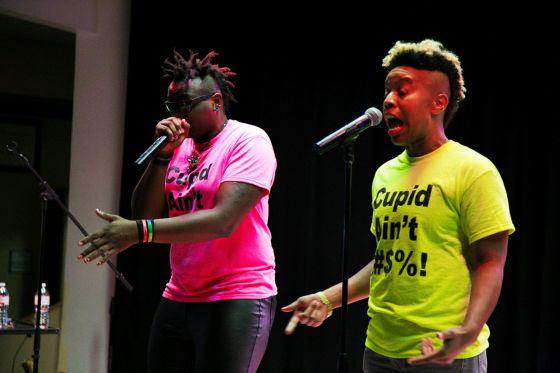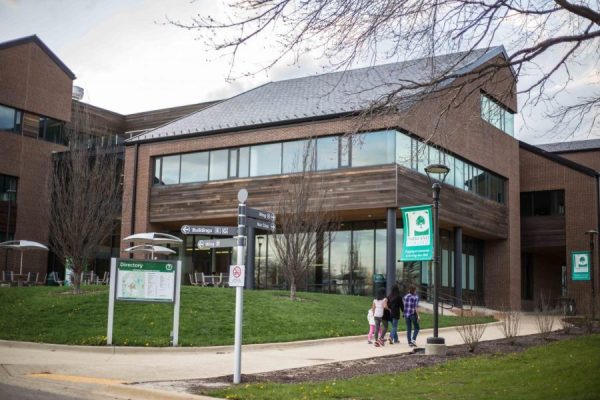J Mase III of #BlackTransMagick seeks to redistribute resources

Photo Courtesy of Windy City Med
J Mase III performs on Dec. 26th. The poet and activist will be featured Monday at the Women’s Resources Center as part of #BlackTransMagick.
Feb 20, 2017
J Mase III and Vita E partnered up to create #BlackTransMagick in 2015, and have traveled around the country performing on college campuses and for community organizations since then.
The duo is scheduled to perform at 12 p.m. on Monday at the Women’s Resources Center as part of the Office of Inclusion & Intercultural Relation’s Lunch on Us weekly discussion series.
The Daily Illini talked to J Mase III over the weekend about the importance of inclusionary spaces on college campuses.
How did #BlackTransMagick originate and when?
J Mase III: #BlackTransMagick originated through myself and Vita, we are part of the administrative team for an organization called awQward. awQward is a trans and queer people of color specific talent agency — we use the acronym TQPOC. We’re both performers and we had an opportunity that kind of showed up through us doing some outreach and talking about the organization in probably June of 2015, so about two years ago. I was scheduled to perform with another awQward artist who fell sick. Vita was still new to the (organization) and we had never performed together. We put it together fairly quickly and had only about one hour to rehearse. We just started creating material from that.
What type of venues do you perform at, and is there anything that influences where you choose to perform?
JM: Primarily we perform at colleges and universities. We also do some community organizations and things like that. I think for us, what our major goal is with #BlackTransMagick, as well as with awQward, is really about the redistribution of resources from larger institutions to black and brown trans, queer folks. We use art as a way to create space for cooperative economics, so that’s part of it. We also try to provide our work free to smaller black and brown organizations and institutions, or at a low cost, so that we can still be in the communities that know us and help to facilitate our work.
Get The Daily Illini in your inbox!
You said you perform on college campuses a lot, can you speak to the importance of giving black and trans voices a platform on a college campus?
JM: I think what’s important for most people, especially on college campuses to recognize, is that the resources in colleges and universities are very much stolen from communities of color. Even in spaces doing LGBTQ work and/or other social justice-centered practices. The institution as a whole — when we talk about the land that institutions take up, when we talk about the money that institutions have — there’s no such thing as creating wealth in the United States of America without taking that from black and brown people through our bodies and labor. And so it’s important because it’s a redistribution of those resources back to the spaces from which they were stolen. It’s also when we talk about being “inclusive” of LGBTQ folks, the people in the LGBTQ community most likely to be impacted by violence, lack of access to education, lack of access to jobs, are trans and queer people of color. So it’s being more honest about who is impacted by these situations. So it behooves people to be honest when they say they’re trying to create intersectional spaces that are rooted in social justice.
Is there anything you think can be accomplished through spoken word and poetry that cannot be accomplished through something like a speech?
JM: I don’t know that it’s something that can’t be accomplished through (either) platform, I think that we tend to take different routes of understanding based on the medium. So there’s something that I can explain to you intellectually, so you know it. But, through art we actually feel something and we’re compelled to do something about it. Intellectually, I know that my life as a black person and a trans person is important, but it’s through art that I actually felt that it mattered.
What type of audience do you welcome to your performances?
JM: Everyone is welcome, but what we do specifically is center the experiences of black and brown trans, queer folks of color. I think for me, and I can’t speak for Vita, I know for myself a lot of times, people try to tell me “Oh, your work is to help people who are not like you learn how to accept you.” That’s not what my work is about. My work is I’m a black, trans, Muslim person on this planet, and for a long time, I didn’t know I had a right to space. So my commitment is to create space for myself and for people in my community, to take up intentional space and take back resources from institutions that seek to erase us. So I encourage TQPOC folks to come, I encourage folks who want to be in solidarity with TQPOC folks to come.





